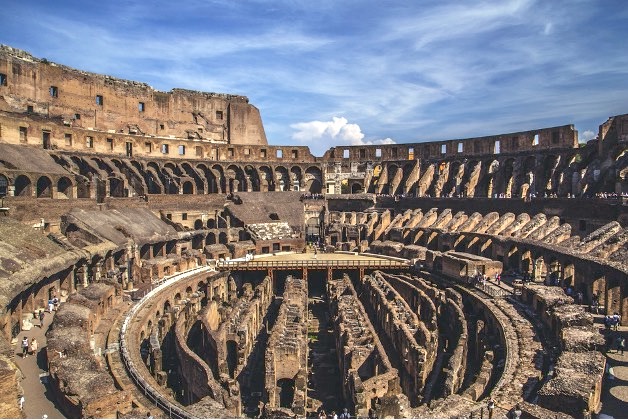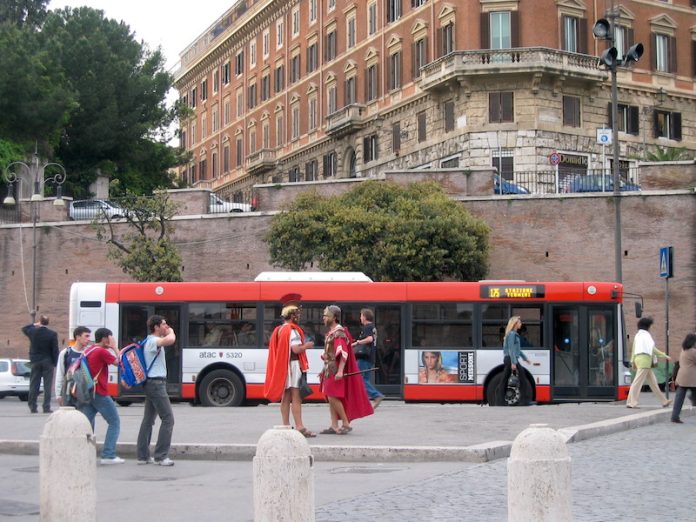The subject of Latin will no longer be offered as an elective at North Sydney Boys High School.
What a revelation. What a stir-up. What a bombshell. It’s been nearly three years since that fatal news was delivered. From teacher to students, from students to students, from students to parents: shock spread at once like wildfire and mutterings abounded in the halls, as if fleet-footed Mercury, messenger of the gods, spread the word himself.
What, they’re killing Latin? Why? Where’s Mr Gollan going? What about the Latin students? What’s going to happen to them?
This was unprecedented in our time at North Sydney Boys High, never before had we seen or heard of a subject being stricken from the list of electives, especially one that had been taught for more than 100 years. Shock turned to anger. There was no time for denial: this was real, this was happening right then and there—and anger darkened to outrage, flagitium. Through some cruel trick of the Fates, the Dead Language was about to live up (rather, down) to its name.
Its real name is lingua Latina, named for Latium, the region around Rome. Originally a local language of the central-western Italian peninsula, Latin is descended from the Italic branch of the Indo-European family tree, the most extensive language family. Expansion under the Kingdom, Republic and Empire periods spread the language to the whole of Italy and outwards as the Romans broadened their imperial horizons. Even after the fall of the Roman Empire, its Germanic conquerors retained the language, recognising its value for more formal and legal applications. It is widely known as the official language of the Holy See of Vatican City (in its Ecclesiastical variant), and has caused many to “replicate” it with that “-us” suffixed onto every word, which some find humorous, others find exhausting, and I find both.
Choose what makes you happy. Don’t let family or society pressure you into doing something you don’t want to. You should enjoy your education. This is what I, alongside my school cohort, was told every time we were to select our elective subjects. And for every single one of those years, I was enraptured by Latin, a childhood love spurred by the page-turning Percy Jackson series and its extended universe, crafted by the myth-moulding hands of Rick Riordan. To 16-year-old me, that love had been torn apart, scissus, stomped on, calcitratus, and squashed to pieces, pressus, by the decision to discontinue Latin. Fortunately I had not commenced my HSC when it happened, and my concerns certainly went out to those students caught in more dire consequences than mine. But I couldn’t help wondering what would I do without my admittedly favourite subject, where would my own educational future lie?
On the other hand, the Roman Empire’s future seemed certain, destined for conquest, reaching its peak under Emperor Trajan in c.117 CE. By then expansion had spanned across the entire Mediterranean, ranging as far as modern-day Great Britain to the north, Portugal to the west, Egypt to the south, and Iraq to the east—a true testament to the Romans’ influence and power, imperium.
With the dominance of Latin-speaking peoples so far across Europe, it’s no wonder that we see remnants of the language living on today in Spanish, French, Italian, Romanian and Portuguese, just to name a few. Latin’s prominence as the language of international communication, science, and the European elite and learned throughout history, has earned it the reputation that sees it appear in many places beyond the Vatican: inscribed beneath statues and on tombs, hidden in the names of businesses and companies, and nobly emblazoned on the mottoes of countless educational institutions.
How can Latin possibly be the Dead Language, lingua mortua?

Here’s what I know about what happened: after our previous Latin teacher, Mr Criscitelli, had left the school. Mr Gollan was employed in 2019 on a casual term-by-term basis. The more permanent post was advertised for a teacher qualified in both Latin and Japanese, a conspicuously unlikely combination. Later in the year, this advertisement changed to require qualifications in Latin and French, a requirement which Mr Gollan unfortunately did not meet. Contract unrenewed, he would leave for Caringbah High, ironically yet fortunately, to headline the new Latin program there. Students were told at the end of the school year that with the absence of a teacher, the subject would no longer be taught from 2020 onwards. Current HSC students would have to complete their studies at nearby North Sydney Girls High or through the NSW School of Languages in Petersham.
Here’s what I don’t know: first and foremost, why was an additional qualification required alongside Latin to teach? It was a thriving and popular subject; there was a French teacher, and there was a Japanese teacher. It would seem someone was taking a lot of trouble to make it impossible for the teaching post to be filled. Perhaps it was time to phase out Latin, regardless of its demand. Perhaps some undisclosed educational statistic showed that Latin was detrimental to overall ATARs or inter-school rankings. But I am no detective, nor have I any experience in scholastic administrative processes. I just wish we had more information; that we could know why something was being taken away.
What did happen, however, was the severe backlash from students, parents and teachers alike. It was heartwarming and gratifying to see the rest of the school community join under a banner some didn’t even belong to. The sense of unity, concordia, the mounting pressure and meetings with executive staff led to a miraculous reversal of the decision. A replacement teacher was found, notably one who did not fit the bill of a concurrent Japanese or French teacher. When I received the email that announced the good news, I felt relief at once. It seemed as if our plea had been heard, which nobody expected to happen. I guess sometimes the Fates have greater plans for you; that’s the way the cookie crumbles, sic friat crustulum.

Latin, on the other hand, hasn’t crumbled. It sleeps dormant in our very words today. Although English is identified as a Germanic language in the Indo-European family, it has very profound Latin influences, with more than half of the English lexicon derived from lingua Latina (English is classified as Germanic because of its syntactical origins, rather than its vocabulary). As a university student now studying Latin and linguistics, I can attest that learning about such a major part of its origins helps us understand English better. And you get to learn a new language that gives insights into a momentous period of the past, not to mention the origins of other languages as well (bonus!). I am relieved that beyond high school, Latin and associated classical studies are wholly and fervently embraced, which has played a significant part in inspiring me to follow these pursuits today.
In some strange way, I’m grateful, gratias ago, that Latin nearly became the Dead Language to me. Maybe in the end, it wasn’t about Latin at all; maybe it was about that experience of loss, and finding one’s voice to speak out and fight to win back what was lost. Feeling the loss of something important to you opens your eyes to what it really meant to you. Lucky for me, my story had a happy ending, but not every story does. That’s when the loss hits harder. I’ve come out the other side of this ordeal holding on a little bit tighter to this language that connects everyone to the past, present and (hopefully) future.


